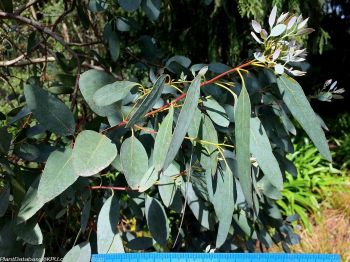Scientific Name:
Eucalyptus
sp.
Pronunciation:
you-kuh-LIP-tus
Common Name:
eucalyptus
Family Name:
Myrtaceae
Plant Type:
Broadleaf evergreen
Key ID Features:
Leaves alternate, most ovate to narrowly elliptic, 3-12cm long x 1-5cm wide, leathery, usually glaucous, margins entire, tend to hang downwards in many species or may be sessile; flower receptacle cup-shaped with numerous stamens around the rim; fruit with many tiny seeds and surrounded by a woody, cup-shaped accessory tissue from the receptacle.
Habit:
Upright
Form:
Round
Texture:
Medium
Mature Height:
7 - 10m
Mature Spread:
7 - 10m
Growth Rate:
Fast
Origin:
Australia / New Zealand
Hardiness Rating:
Zone 8b: (-9.4 to -7 °C)
Exposure:
Full sun
Soil/Growing Medium:
Well-drained
Landscape Uses:
Cut flower or foliage, Fragrance
Additional Info:
Species shown may include E. coccifera, E. cinerea and E. polyanthemos. Others species hardy to atleast zone 8 include
E. camaldulensis,
E. citriodora,
E. globulus,
E. gunnii,
E. nicholii,
E. parvula, and
E. pauciflora.
Leaf Morphology:
Form:
Simple
Arrangement:
Alternate
Texture/Venation:
Leathery
Surfaces:
Glabrous, Glaucous, Distinctive smell
Colour in Summer:
Bluish, Green, Gray glaucous.
Colour in Fall:
Bluish, Green
Shapes:
Lanceolate, Orbicular, Ovate
Apices:
Acute, Rounded
Bases:
Rounded, Sheathing
Margins:
Entire
Inflorescence Type:
Flower Morphology:
Flowers perfect
Number Of Petals:
0
Corolla Shape:
Rotate/stellate
Ovary Position:
Superior
Colour (petals):
Showy, White, Yellow, Pink, Red (stamens give the colour)
Flower Scent:
Fragrant
Flower Time at Peak:
Jul
Additional Info:
Numerous fluffy stamens (may be white, cream, yellow, pink or red); in bud, the stamens are enclosed in a cap known as an operculum which is composed of the fused sepals or petals or both.





